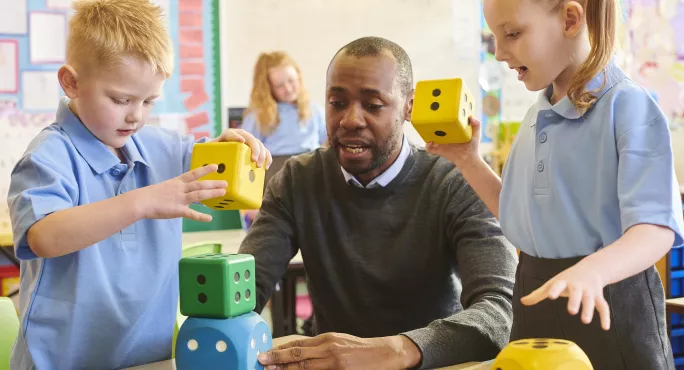Guided play ‘sometimes better’ than direct instruction

Guided play-based learning can be as effective, and sometimes better, than formal adult-led teaching for pupils up to the age of 8, according to a new analysis from the University of Cambridge.
The research also found that play-based learning may have a more positive effect on younger children’s early maths skills compared with traditional direct instruction.
The findings, published today, are based on studies undertaken between 1977 and 2020, which together documented guided play’s impact on the learning of around 3,800 children aged 3 to 8.
- EYFS: How to establish a routine
- Omicron: Primaries tighten Covid rules as cases soar
- Primary: Hancock calls for primary pupils dyslexia check
“Guided play” refers to playful educational activities, which, although gently steered by an adult, give children the freedom to explore a learning goal in their own way.
The university researchers believe their new study is the first systematic attempt to examine the effects of guided play specifically, rather than the more traditional focus on the broader debate between general definitions of play and direct instruction.
EYFS: Guided play ‘enhances learning and development’
Examples of guided play include creating imagination-based games that require children to read, write or use maths. Activities could also involve incorporating simple early learning skills - such as counting - into play.
Paul Ramchandani, professor of play in education, development and learning at the University of Cambridge, said that the argument is often made that play adds little to education. However, he said: “Although there are still some big questions about how we should use guided play in classrooms, there is promising evidence that it actively enhances learning and development.”
The study found that “a playful approach to learning” can be just as effective as more traditional, “teacher-led methods” in developing key skills. These key skills are listed as: literacy, numeracy, social skills and essential thinking skills. The research also suggests that children may master some skills - notably in maths - more effectively through guided play.
Guided play-based learning was also seen to have a positive, knock-on effect on educational progress, increasing children’s motivation, persistence, creativity and confidence.
Dr Elizabeth Byrne, co-author of the report, said: “It’s only recently that researchers have started to conceptualise learning through play as something that exists on a spectrum.
“At one end you have free play, where children decide what to do with minimal adult involvement; at the other is traditional, direct instruction, where an adult tells a child what to do and controls the learning activity.”
Dr Byrne said that guided play “falls somewhere in between”.
The impact on maths skills
According to the academics involved, the results showed “significant evidence” that guided play has a greater positive impact on some areas of children’s numeracy than direct instruction. The report says this includes early maths skills and shape knowledge.
The authors said there was also evidence that guided play better supports the development of children’s cognitive ability to switch between tasks.
Dr Byrne said that pupils often struggle with mathematical concepts “because they are abstract”.
“They become easier to understand if you are actually using them in an imaginary game or playful context. One reason play matters may be because it supports mental visualisation,” she said.
Dr Christine O’Farrelly, a senior research associate at the faculty of education, offered an additional reason that guided play may be useful in learning: “It’s likely that playful activities have the sort of positive impact we saw in our analysis partly because they are acting on other skills and processes which underpin learning.
“If we can understand more about how guided play shapes learning in this way, we will be able to identify more precisely how it could be used to make a really meaningful difference in schools.”
The study has been published in the journal Child Development.
Register with Tes and you can read two free articles every month plus you'll have access to our range of award-winning newsletters.
Keep reading with our special offer!
You’ve reached your limit of free articles this month.
- Unlimited access to all Tes magazine content
- Save your favourite articles and gift them to your colleagues
- Exclusive subscriber-only stories
- Over 200,000 archived articles
- Unlimited access to all Tes magazine content
- Save your favourite articles and gift them to your colleagues
- Exclusive subscriber-only stories
- Over 200,000 archived articles



